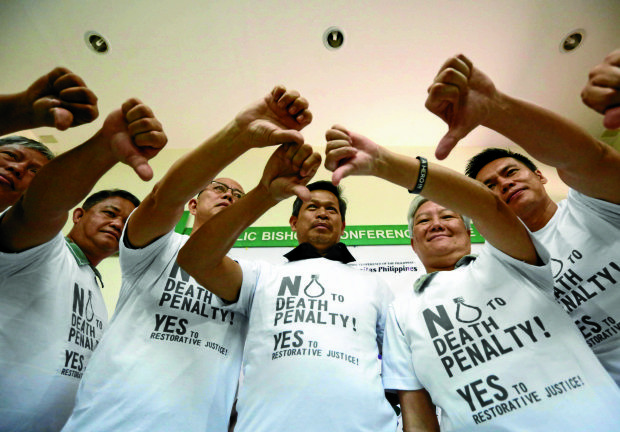Catholics, civil society march vs death penalty

NO TO DEATH PENALTY. Running priest Fr. Robert Reyes (third from left) thumbs down death penalty during a press conference with Church leaders at the headquarters of the Catholic Bishops Conference of the Philippines in Intramuros, Manila, on Friday.—MARIANNE BERMUDEZ
There is no obstacle too big to conquer for Catholic lay faithful and members of civil society groups, who have begun a long march from Mindanao to Manila to urge senators to vote against the bill seeking to restore the death penalty for heinous crimes.
The “Lakbay Buhay Laban sa Death Penalty,” which began on Thursday in Cagayan de Oro, expects to reach the Senate in Pasay City by May 24, feast day of Our Lady, Help of Christians.
Fr. Edwin Gariguez of the Catholic Bishops Conference of the Philippines (CBCP) said the marchers wanted legislators to know that the Catholic lay people and civil society groups were actively working against the death penalty.
“It is disturbing that in one stroke, it was railroaded in Congress,” Gariguez said of the death penalty bill. “They (administration leaders) hold the solons by the neck to make them vote for it, and even threaten not to grant favors to those against it.”
Gariguez, executive secretary of the CBCP’s National Secretariat for Social Action, made the remarks at a press conference on Friday to launch the 21-day march from Mindanao to Manila.
Article continues after this advertisementAlso present was running priest Fr. Robert Reyes, Raul Socrates Banzuela of the Pambansang Kilusan ng mga Samahang Magsasaka (Pakisama), and Elizabeth Yang of the Kilusan ng Kababaihang Pilipino (Pilipina).
Article continues after this advertisementThe march to Manila will pass through 14 cities all over the country.
The highlight of the pilgrimage is a gathering in the Rizal Park on May 19, which is expected to draw 30,000 antideath penalty advocates, including students from Catholic universities.
“We expect the mobilization in Rizal Park to be the biggest. It will be a combination of Church social movements, etc.,” said Banzuela.
The march will pass through Cebu City, Tacloban City, Borongan, Catarman, Sorsogon, Legaspi City, Naga City, Gumaca, Lucena City, San Pablo City, Lipa City, Imus City, Ateneo de Manila University in Quezon City, northern Metro Manila, and University of Santo Tomas and the Rizal Park in Manila.
The pilgrims will conduct public educational fora during stopovers to raise public awareness on how the revival of the death penalty will lead to a culture of death in the Philippines.
“Many have gone silent already. Even the Church has been deemed as having been silenced. With this pilgrimage, we will creep out of our caves and walk toward the light,” Reyes said.
Gariguez said Manila Archbishop Luis Antonio Cardinal Tagle is expected to issue his own statement on the march since it will end in his archdiocese.
For his part, CBCP president and Lingayen-Dagupan Archbishop Socrates Villegas welcomed the initiative of the laity to manifest their opposition to the death penalty bill.
The CBCP’s Episcopal Commission for the Laity is among the organizers of the march.
The prelate also urged bishops and archbishops of the archdioceses of Cebu, Palo, Caceres, and Lipa, and the dioceses of Legaspi and Lucena to show support and hospitality to the participants of the march.